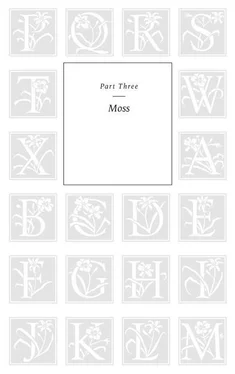Vanessa Diffenbaugh - The Language of Flowers
Здесь есть возможность читать онлайн «Vanessa Diffenbaugh - The Language of Flowers» весь текст электронной книги совершенно бесплатно (целиком полную версию без сокращений). В некоторых случаях можно слушать аудио, скачать через торрент в формате fb2 и присутствует краткое содержание. Жанр: Старинная литература, на английском языке. Описание произведения, (предисловие) а так же отзывы посетителей доступны на портале библиотеки ЛибКат.
- Название:The Language of Flowers
- Автор:
- Жанр:
- Год:неизвестен
- ISBN:нет данных
- Рейтинг книги:4 / 5. Голосов: 1
-
Избранное:Добавить в избранное
- Отзывы:
-
Ваша оценка:
- 80
- 1
- 2
- 3
- 4
- 5
The Language of Flowers: краткое содержание, описание и аннотация
Предлагаем к чтению аннотацию, описание, краткое содержание или предисловие (зависит от того, что написал сам автор книги «The Language of Flowers»). Если вы не нашли необходимую информацию о книге — напишите в комментариях, мы постараемся отыскать её.
The Language of Flowers — читать онлайн бесплатно полную книгу (весь текст) целиком
Ниже представлен текст книги, разбитый по страницам. Система сохранения места последней прочитанной страницы, позволяет с удобством читать онлайн бесплатно книгу «The Language of Flowers», без необходимости каждый раз заново искать на чём Вы остановились. Поставьте закладку, и сможете в любой момент перейти на страницу, на которой закончили чтение.
Интервал:
Закладка:
Elizabeth’s list was detailed, exhausting, and exact but never grew and never changed. Every day, after breakfast and my morning walk, I wrote in the black leather-bound journal she had purchased for me. I was a good writer and an excellent speller, but I made purposeful mistakes to keep Elizabeth by my side, sounding out words and proofing pages. When I finished, I helped her prepare lunch, and we measured, and poured, and doubled recipes, and halved them. Silverware in neat stacks became fractions and cups of dry beans complicated word problems. Using the calendar by which she tracked the weather, she taught me to calculate averages, percentages, and probabilities.
At the end of each day, Elizabeth read to me. She had shelves and shelves of children’s classics, dusty hardcovers with stamped gold titles: The Secret Garden, Pollyanna , and A Tree Grows in Brooklyn . But I preferred her viticulture textbooks, the illustrations of plants and chemical equations clues to the world that surrounded me. I memorized vocabulary—nitrate leaching, carbon sequestration, integrated pest management—and used them in casual conversation with a seriousness that made Elizabeth laugh.
Before bed, we marked off each day on a calendar in my room. Throughout January, I simply scratched a small red X in the box underneath the date, but by the end of March, I wrote the high and low temperatures, as Elizabeth did on her own calendar, what we had eaten for dinner, and a list of the day’s activities. Elizabeth cut a stack of Post-its the size of the calendar’s squares, and many evenings I filled five or six sheets before crawling into bed.
More than a nightly ritual, the calendar was a countdown. August second—the day after my supposed birthday—was highlighted, the entire box colored pink. In black felt-tip, Elizabeth had written eleven a.m., third floor, room 305. The law mandated I live with Elizabeth for a full year before my adoption could be finalized; Meredith had scheduled our court date for a year to the day from my arrival.
I checked the watch Elizabeth had given me. Another ten minutes before she would let me back inside. I leaned my head against the vine’s bare branches. The first bright green leaves had sprouted from tight buds, and I studied them, perfect, fingernail-sized versions of what they would become. Smelling one, I nibbled a corner, thinking I would write in my journal about the taste of a grapevine, before the grapes. I checked my watch again. Five minutes.
Out of the quiet, I heard Elizabeth’s voice. It was clear, confident, and for a moment I thought she was calling me. Scampering back to the house, I stopped midstride when I realized she was on the phone. Though she had not mentioned her sister once since our visit to the flower farm, I knew in an instant she had called Catherine. I sat down in the dirt beneath the kitchen window, shocked.
“Another crop,” she said. “Safe. I’m not a drinker, but I have more sympathy for Dad these days. The appeal of waking up to a shot of whiskey—‘to numb the fear of frost,’ as he used to say—I can understand it.” Her pause was brief, and I realized that, again, she was speaking only to Catherine’s answering machine. “Anyway, I know you saw me that day in October. Did you see Victoria? Isn’t she beautiful? You obviously didn’t want to see me, and I wanted to respect that, to give you more time. So I haven’t called. But I can’t wait any longer. I’ve decided to start calling again, every day. More than once a day, probably, until you agree to talk to me. I need you, Catherine. Don’t you understand? You’re all the family I have.”
I shut my eyes at Elizabeth’s words. You’re all the family I have . For eight months we had been together, eating three meals a day at the kitchen table, working side by side. My adoption was less than four months away. Still, Elizabeth did not consider me family. Instead of sorrow, I felt rage, and when I heard the phone click, followed by the gushing sound of dirty water being poured down a drain, I pounded up the front steps. I struck the door with clenched fists, trying to knock it in. What am I, then? I wanted to scream. Why are we pretending?
But when Elizabeth opened the door and I looked into her surprised face, I started to cry. I could not remember ever having cried, and the tears felt like a betrayal of my anger. I slapped at my face where tears ran down in streams. The sting of each slap made me cry harder.
Elizabeth didn’t ask why I was crying, just pulled me into the kitchen. She sat on a wooden chair and drew me awkwardly into her lap. In a few months I would be ten. I was too old to sit on her lap, too old to be held and comforted. I was also too old to be given back. Suddenly I was both terrified of being placed in a group home and surprised that Meredith’s scare tactic had worked. Burying my face in Elizabeth’s neck, I sobbed and sobbed. She squeezed me. I waited for her to tell me to calm down, but she didn’t.
Minutes passed. A timer on the kitchen stove buzzed, but Elizabeth did not stand up. When I finally lifted my head, the kitchen was filled with the scent of chocolate. Elizabeth had made a soufflé to celebrate the turn in the weather, and the scent was rich and sweet. I wiped my eyes on the shoulder of her blouse and sat up, pushing myself back to look at her. When our eyes met, I saw that she had been crying, too. Tears clung and then dropped from the edge of her jawbone.
“I love you,” Elizabeth said, and I started to cry all over again.
In the oven, the chocolate soufflé began to burn.
9 .
Grant left for the flower market early Monday morning, but I did not go with him. When I awakened hours later, I was surprised to find I was not alone on the property. Men shouted to one another between rows, and women knelt on the wet soil, pulling weeds. I watched it all happen from the windows: the pruning, tending, feeding, and harvesting.
It had never crossed my mind that anyone but Grant tended the acres and acres of plants, but once I saw the workers in action, it seemed ridiculous that I ever imagined it any other way. The job was enormous; the tasks were many. And while I didn’t like having to share the property with anyone, especially on the first day Grant had left me alone, I was grateful for the workers who coaxed the hundreds of varieties of flowers into bloom.
I changed into a clean white T-shirt and brushed my teeth. Grabbing a loaf of bread and my camera, I walked outside. The workers greeted me with a deep nod and a smile but didn’t attempt to make conversation.
I entered the first greenhouse. It was the one Grant had opened for me on our first walk, and it contained mainly orchids, with a single wall of hibiscus varieties and amaryllis. It was warmer, and I was comfortable in my thin T-shirt. I began on the top shelf of the left wall. Numbering my notebook, I took two photographs of every flower and recorded the scientific name of each one instead of the camera settings. Afterward, I used one of Grant’s gardening books to determine the common name for each flower, scrawling it in the margins and opening my flower dictionary to put an X by the flowers I photographed. I shot four rolls of film and put sixteen X’ s in my dictionary. It would take me all week to shoot what was in bloom, and all spring to wait for what was not. Even then, I would likely be missing flowers.
Only steps from the back wall, my eye buried in the viewfinder, I tripped on a large object in the middle of the aisle. When I looked down I saw a closed cardboard box. The word Jonquil was scratched onto the top in thick black marker.
I peered inside the box. Six ceramic pots were packed side by side, their sandy soil wet, as if they had been watered that morning. I stuck my finger an inch into the dirt, hoping to feel a shoot on the verge of emerging, but there was nothing. Closing the box, I continued on my path, the camera clicking and the film advancing every time I found a new plant with an open bloom.
Читать дальшеИнтервал:
Закладка:
Похожие книги на «The Language of Flowers»
Представляем Вашему вниманию похожие книги на «The Language of Flowers» списком для выбора. Мы отобрали схожую по названию и смыслу литературу в надежде предоставить читателям больше вариантов отыскать новые, интересные, ещё непрочитанные произведения.
Обсуждение, отзывы о книге «The Language of Flowers» и просто собственные мнения читателей. Оставьте ваши комментарии, напишите, что Вы думаете о произведении, его смысле или главных героях. Укажите что конкретно понравилось, а что нет, и почему Вы так считаете.












